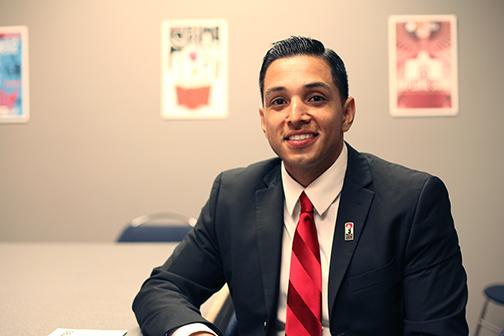Name: Gabriel Torres
Year: Junior
Major: Business administration with an emphasis in management
Leadership experience:
- U.S. Army Veteran
- U.S. Army recruiter
- College of Business transfer mentor
- Compact for Success mentor
- SDSU Army ROTC Cadet
Business administration junior Gabriel Torres President has plans to empower San Diego State students to become the best they can be as Associated Students president.
“If I could accomplish only one thing, it would be to redefine what A.S. is capable of doing,” Torres said.
In order to accomplish this goal, Torres said he wants to change how A.S. operates at SDSU.
“I think the number one thing I would focus on that I haven’t seen this year are programs that empower students,” Torres said. “Like programs that help them find exactly what they are passionate about and help them set goals for their education.”
Torres said his goal with these programs is to help students graduate on time, with a degree in a field they are actually interested in. Torres said he wants to coordinate with career services to talk to incoming students as early as orientation to help them better identify what they want out of their education.
Torres also has multiple plans to reach out to the community in ways which he hasn’t seen A.S. try before. One of these ideas is a weekly coffee hour during which A.S. executives met with different student organizations on campus.
“I think it’s common that we lay back and wait for students to come to us when really as leaders we should be going out to the community,” Torres said. “One thing I have learned from the military is that a leader goes to the source.”
Another program Torres plans to implement is a student-professor meeting program inspired by “dining with a professor” programs that he said are common in University of California and Ivy League schools. This program has students choose a professor they would like to meet with and then the university pays for the student and the professor’s meal.
“The point of the program is to alleviate stress I think students feel with office hours,” Torres said. “It helps students and professors to open up to each other.”
Torres said some of the issues he has with A.S. are the changes brought about by last year’s restructuring.
“The restructuring has definitely not been beneficial to every group on campus,” Torres said. “There is a lack of communication between A.S. and student organizations.”
According to Torres, the disconnect between the different parts of A.S. is mainly the responsibility of the executives, not student organizations. In order to alleviate this problem, he plans to work with the other executive officers to reach out to organizations that have been left behind by restructuring.
“The number one thing would be to increase the communication from the top down,” Torres said.
Torres is also critical of the recent Student Success Fee forum process.
“I think in thought the forum process was a good idea,” Torres said. “But in practice it doesn’t exactly work out.”
He attended several of the forums and said only two or three students attended each. The low turnout bothered Torres.
“As leaders when you see only two or three students showing up to a forum, you should say this isn’t going to work because the goal of this was to target students and inform them,” Torres said.
Torres said that he thinks they should have tried a method other than the forums after it became apparent the forums would have a low turnout. He was also critical of the name of the fee and how it was designed.
“Ninety percent goes to hiring teachers, so maybe we should have called it the ‘Hiring New Teachers Fee,’ or something less misleading,” Torres said.
The lack of student control in regards to how the money for the fee would be allocated was especially worrisome for Torres.
“Are they going to be better teachers? Are they adding classes we need?” Torres said. “I think it’s misleading to call it student success when you don’t have a clear view of how teachers are chosen.”
Torres said the administration should tap into its growing philanthropy resource before they ask students to pay more in tuition fees.
“I think the school needs more students to stand up for what they believe in,” Torres said, “as long as they stay within the rules and regulations of the school of course.”
Torres is also against the school-wide skating ban.
“I’m for skateboarding on campus as long as they stick to the bike lane but safety is still important,” Torres said.
He said it is better for a healthy university for students to be able to choose how they get to class.
“It’s just better for the environment if students can find ways to get to school that aren’t cars,” Torres said.
Photo by Monica Linzmeier, Photo Editor







